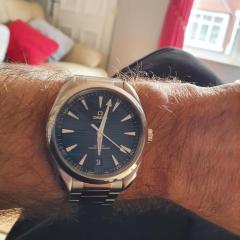-
Recently Browsing
- No registered users viewing this page.
-
Topics
-
Posts
-
By RichardHarris123 · Posted
@JohnR725 has pointed out many times that the Swiss don't care about amplitude, the timekeeping is the most important. Give yourself a pat on the back, great beat error and timekeeping, nothing to be disappointed about. -
By RichardHarris123 · Posted
I'm bothered but I agree he's a busy man and I don't want to bother him. In the meantime, we really do need to have other ways of contacting each other -
By RichardHarris123 · Posted
This is as complicated as epilame, too many unknowns. The life expectancy in the UK is circa 80, so most people from 1944 or earlier are dead. Assume they had children at circa 20, they died in 2004. Their children started selling 1944 watches in 2004, so pre-1944 watches must be getting more rare. It doesn't work though because as you stated some were sold as tat, but since watch prices have increased people have decided to sell when they may not of done in the past. -
I was wondering whether anyone could assist with some questions I have about my latest acquisition, which is a two train ‘Bravingtons Renown’ mantel clock - Pics attached I have done some reading about Bravingtons and believe they sourced movements from various suppliers, so I wondered whether anyone recognises this one. I have stripped and cleaned the movement and the clock is now running well, but there are a couple of dodgy brass springs that I would like to replace. I haven’t found anything suitable searching the internet so I wondered does anyone know of a supplier that might help. Last question is about the veneer on the case, it is generally in reasonable condition but there are a couple of patches on the top where the veneer has lifted. So far, I have tried to reactivate the existing adhesive by heating from below and above with a hair drier, then clamping for a day or two. It has improved slightly but the bulge is still visible. I’d be grateful for any advice if anyone has dealt with this sort of repair before.
-
By watchweasol · Posted
Hi some pictures o& the movement and case would be appreciated so we can ascertain what the problem is you are having in fitting the movement. Thank you.
-







Recommended Posts
Join the conversation
You can post now and register later. If you have an account, sign in now to post with your account.
Note: Your post will require moderator approval before it will be visible.